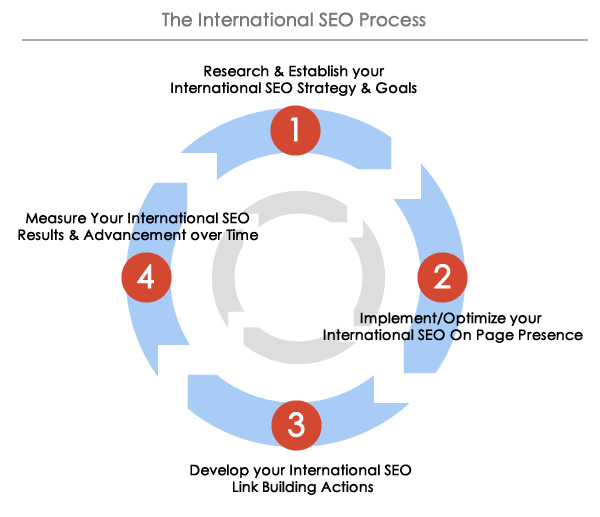Crafting a Global Impact: International SEO Techniques for Lasting Growth
Crafting a Global Impact: International SEO Techniques for Lasting Growth
Blog Article
Navigating the Digital Landscape: Leveraging International Search Engine Optimization for Cross-Border Success
In today's interconnected digital globe, businesses are significantly looking beyond boundaries to touch right into international markets. The intricacy of browsing the digital landscape on a global range requires a nuanced method, from recognizing the principles of International Search engine optimization to applying geotargeting and multilingual search phrase strategies.
Recognizing International SEO Fundamentals
Browsing the complexities of global SEO needs a solid understanding of essential concepts to efficiently broaden on-line presence across boundaries. One essential facet of global search engine optimization is recognizing the importance of localization. This involves tailoring web site web content to suit the etymological, cultural, and industrial distinctions of target audience. Key phrases need to be not just equated but also adapted to reflect how users in different areas look for information.
In addition, having a clear understanding of geo-targeting is essential. This entails showing to search engines the details nations or regions a web site is targeting. Carrying out hreflang tags is one means to connect this information, making sure that the appropriate variation of a web page shows up in the search results page for a user in a specific area.
Furthermore, understanding the influence of local search engines and social networks systems is essential for international search engine optimization success. For example, while Google is dominant in many regions, countries like China have their own search engines like Baidu, calling for tailored techniques for each and every system to take full advantage of online exposure.

Targeting Multilingual Key Phrase Approaches
Creating multilingual search phrase strategies is crucial for efficiently getting to diverse global audiences and making best use of online presence throughout various linguistic areas. When targeting multilingual key words strategies, it is essential to conduct detailed study to understand the specific search terms and phrases utilized by the target audience in each etymological region. This involves not just translating key phrases however likewise thinking about social nuances, local languages, and search trends unique to every target audience.
To develop an effective multilingual keyword phrase technique, it is necessary to focus on significance and search intent. Keywords ought to straighten with the material on the internet site and reverberate with the social context of the target audience. Using devices such as Google Keyword Organizer, SEMrush, or Ahrefs can help identify high-performing key words in various languages and examine their search quantity and competition level.
Additionally, tracking and analyzing the efficiency of multilingual keyword phrases on a regular basis is essential for optimizing and improving the strategy in time. By continually adapting to adjustments in search actions and trends, companies can enhance their online presence and attract even more global web traffic to their internet sites.
Carrying Out Geotargeting and Hreflang Tags
When aiming to boost global search engine optimization methods, incorporating geotargeting and hreflang tags is essential for optimizing internet site visibility throughout various regions. Geotargeting entails customizing content to specific places, ensuring that users in different locations obtain relevant information. By implementing geotargeting, services can enhance their neighborhood search positions and draw in region-specific her comment is here web traffic.

Optimizing Site Structure for Global Visibility
To even more improve global search engine optimization approaches beyond geotargeting and hreflang tags, enhancing the website structure is necessary for achieving international visibility and taking full advantage of reach throughout different regions. A well-structured web site not only enhances customer experience yet also helps with internet search engine spiders in comprehending the web content and context of the website. When intending for worldwide exposure, it is vital to guarantee that the web site is arranged in a sensible way that satisfies users from various countries. Executing a clear power structure with distinct categories and subcategories can help in boosting the site's navigating and user-friendliness.
Additionally, about his developing language-specific subdirectories or subdomains can assist browse engines supply the right variation of the web site to individuals based on their language choices, better boosting the general user experience. Additionally, optimizing URL frameworks to include relevant key words and geotargeted terms can boost the site's visibility in different areas. By structuring the website properly for international target markets, businesses can enhance their opportunities of attracting international traffic and increasing their reach across borders.

Monitoring and Assessing Cross-Border Performance
Reliable tracking and analyzing of cross-border performance is vital for evaluating the success of international search engine optimization methods and determining possibilities for enhancement in international reach and exposure. By closely tracking essential performance signs (KPIs) throughout various markets, services can gain important insights into the efficiency of their cross-border search engine optimization efforts. Keeping track of metrics such as organic web traffic, keyword rankings, conversion prices, and bounce prices can offer a detailed sight of just how well a web site is carrying out in various areas.
Assessing cross-border efficiency data permits organizations to identify trends, patterns, and areas for optimization. By comparing efficiency throughout different nations, regions, or languages, companies can determine successful strategies and center content to much better accommodate particular target market. Furthermore, monitoring cross-border efficiency allows organizations to remain active and receptive in the ever-evolving electronic landscape. Normal evaluation of search engine optimization efficiency on an international range guarantees that firms can adjust their strategies swiftly to profit from emerging possibilities and keep an affordable side in worldwide markets.
Verdict
Finally, global SEO plays a critical role in accomplishing cross-border success by maximizing web sites for global visibility, targeting multilingual key words strategies, executing geotargeting and hreflang tags, and keeping track of cross-border efficiency. By recognizing the Get the facts principles of worldwide search engine optimization and maximizing internet site structures appropriately, organizations can properly get to and engage with their target audiences across various regions and languages. This tactical technique is essential for broadening market reach and driving on-line growth in today's digital landscape.
Report this page